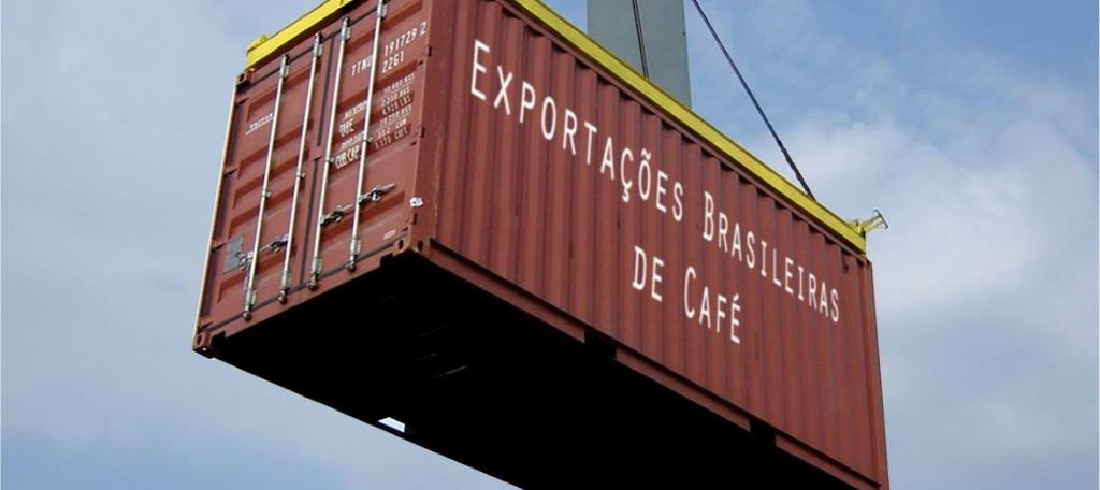
Coffee: Brazil exports 9.6 million sacks from 2021/22 crop, achieves record US$ 8.1bn
Jul, 14, 2022 Posted by Gabriel MalheirosWeek 202228
Brazil exported 39.589 million coffee sacks of 60 kg and obtained a record foreign exchange revenue of US$ 8.117 billion, with shipments to 121 destinations from the 2021/22 harvest, which ended last June. Compared to the previous season, the performance represented a drop of 13.3% in volume but a growth of 38.7% in value. The data are part of the monthly statistical report released by the Brazilian Coffee Exporters Council (Cecafé).
According to the entity’s president, Günter Häusler, given the reduced supply caused by the low biennial productivity cycle of Arabica crops, and all the existing logistical bottlenecks, such as high freight costs, booking cancellations, cargo rollovers, lower availability of containers, and little space on vessels, the performance recorded in 2021/22 can be seen as positive.
He stresses that, despite the drop in volume compared to the 2020/21 season, a record harvest year in Brazil, the amount shipped from July 2021 to June 2022 is still within the average of the last five harvests, which is 39.480 million bags.
“The revenue, which reached a historic high, reflects the favorable exchange rate and the professionalism of Brazilian exports in these trying times, allowing Brazil to keep its representativeness in global trade and take advantage of high international prices,” comments.
The harvest’s performance was assessed using data from June of this year, when Brazil sold 3.144 million bags overseas, a number 2.1% higher than in the same month of 2021. In terms of income, the growth was even greater, 69.9%, with exports bringing in US$ 733.8 million for the country.
“The positive performance seen in June is a consequence of the efforts of entire logistics teams and the slight improvement seen in the maritime transport market, which is still far from normal and presents many challenges,” analyzes Häusler.
See below the track record of coffee exports from Brazil in the period between January 2021 to May 2022. The data below is from the platform DataLiner.
Coffee exports from Brazil | Jan 2021 – May 2022 | WTMT
Source: DataLiner (click here to request a demo)
Main destinations
In the 2021/22 market year, the United States was the primary importer of coffee from Brazil, acquiring 7.936 million bags, a volume 4.8% lower than the 8.339 million bags purchased from July 2020 to June 2021. This amount corresponded to 20% of the total exports from Brazil in the recently ended harvest.
Germany, representing 16.3%, imported 6.465 million bags (-18.7%) and occupied second place in the ranking. Then came Belgium in third, with the purchase of 3.182 million bags (-17%); Italy, with 3.124 million (+12.9%); and Japan, with the acquisition of 2.171 million bags (-17.3%).
Notable is the success of shipments to Colombia, the world’s third-largest coffee producer, which imported 1.247 million bags of the national product in the 2021/22 season, ranking sixth among major partners. This sum constituted 3.2% of Brazilian remittances overseas, representing a 9.6 percent growth over acquisitions made between July 2020 and June 2021.
On the other hand, the persistence of the crisis in Ukraine had an impact on exports to Russia, which fell from the sixth position in the ranking to ninth considering the total of the recently finished commercial season. The Eastern European ordered 950,860 bags, representing a 20.3% decrease from the previous harvest.
Coffee variations
Arabica coffee was the most exported in the 2021/22 cycle, with 32.889 million bags shipped abroad, corresponding to 83.1% of the total. Soluble coffee registered shipments equivalent to 4.049 million sacks, accounting for 10.2%. In third came the shipments of the canephora variety (robusta + conilon), with exports of 2.603 million bags (6.6%), and, finally, exports of either roasted or roasted and grounded beans, with 47,944 bags (0.1%).
Special products
Special coffee loads, which have superior quality of some kind of sustainability certificate, accounted for 19.8% of total Brazilian exports from July 2021 to June this year, with the shipment of 7.829 million bags abroad. This volume represented a decline of 0.8% in comparison with the 7.889 million bags the country shipped in the same period.
The average price was US$ 258.92 per bag, providing foreign exchange revenue of US$ 2.027 billion in these 12 months, corresponding to 25% of the total shipments. Compared with the 2020/21 season, the value is 55% higher.
In the ranking of the main destinations of specialty coffee in the 2021/22 MY, the United States was at the top, importing 1.616 million bags, equivalent to 20.6% of the total. Germany came in second, with 1.416 million bags, representing 18.1%; Belgium, with 979,585 bags (12.5%), was third; Italy, with 634,096 bags (8.1%), fourth; and Japan, with 414,934 sacks (5.3%), fifth.
Ports
The Santos maritime complex remained the leading coffee exporter from Brazil in the 2021/22 cycle, with the shipment of 31.440 million bags, equivalent to 79.4% of the total. Closing the list of the first three are the ports of Rio de Janeiro, which accounted for 15.2% of shipments, sending 6.019 million bags in 12 months of harvest, and Vitória (ES), with the shipment of 567,631 bags abroad (1.4%).
Calendar year
In the first six months of 2022, Brazil exported 19.922 million bags of coffee, which implied a decline of 4.9% compared to the 20.943 million registered between January and the end of June last year. Nevertheless, this amount generated US$ 4.640 billion, the highest recorded over the previous five years and 65.4% higher than the amount obtained in the preceding period.
-
Blog News (ENG)
Jan, 27, 2023
0
Cotton: Brazil exports 92.22 thousand t in January
-
Ports and Terminals
Feb, 26, 2025
0
Brazilian Container Port Saturation Causes Billion-Dollar Losses
-
Other Logistics
Jul, 20, 2022
0
Suzano closes USD 120M deal to lease rail wagons for five years
-
Ports and Terminals
Feb, 19, 2025
0
Customs Auditors’ Strike Causes Millions in Losses at Brazilian Ports and Airports



